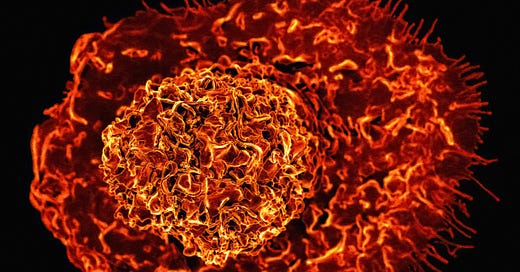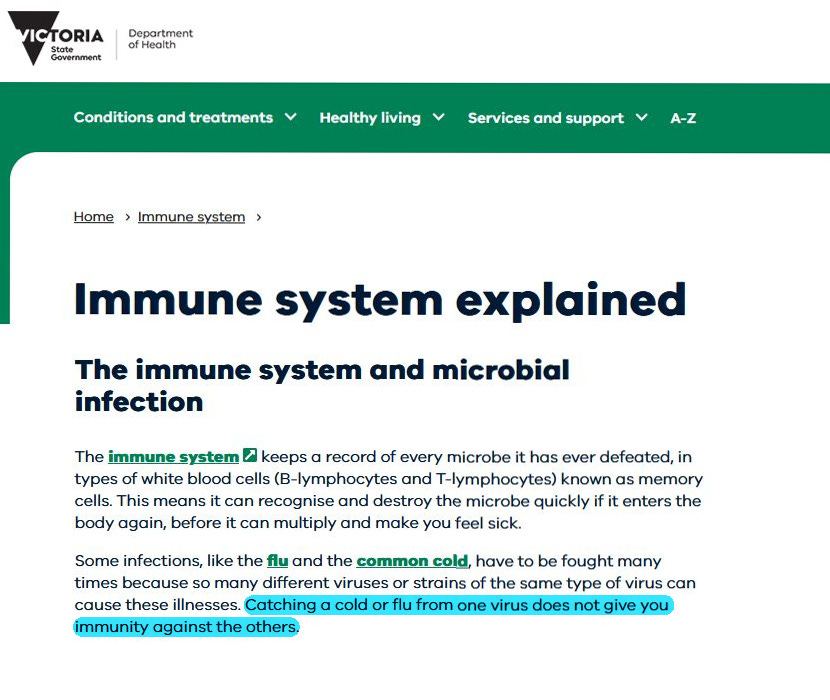Our friends and family think they understand their immune system because George Carlin explained it to them in the 90s:
Where did this sudden fear of germs come from? What do you think you have an immune system for? It's for killing germs. But it needs practice. It needs germs to practice on. If you kill all the germs around you, and lead a completely sterile life, then when germs do come along you're not going to be prepared. What are you gonna do? I'll tell you what, you're gonna get sick and you're gonna die and you're gonna deserve it because you're f-ing weak and you've got a f-ing weak immune system.
George Carlin was right about a lot of things, but he was wrong on this one.
(He got plastic wrong, too.)
Unfortunately, this part of his 11th HBO standup special became permanently lodged into the American cultural memory. I only saw it once as a kid, but it stayed with me for the rest of my life.
Not even AP Biology could dislodge it.
I, too, used to think you built your immune system up by exposing yourself to harmful germs. How could the great prophet George Carlin be mistaken on something that made so much intuitive sense, especially when you dropped a few f-bombs in there? I also thought it was a good thing to exercise your way through a cold. Then I opened myself up to the possibility that I was wrong.
In the words of Carl Sagan, I'd been bamboozled.
In early 2020, this Carlin bit inspired countless reaction videos that still litter the internet. Anti-science zealots have used George Carlin's monologue on disease thousands of times over the last four years to ridicule masks, vaccines, and clean air. Everywhere you look, that piece of standup looms in the background, and it's getting revived again for bird flu. But even George Carlin got the idea from somewhere else.
You can trace this misguided notion back to hygiene theory, proposed by David Strachan in 1989. Strachan argued that a whole range of health problems in the late 20th century had roots in "a lower incidence of infection in early childhood." Basically, our immune systems weren't getting enough exposure to bacteria and viruses. He was mainly talking about the rise in childhood allergies as the result, but the media began printing loose interpretations of his studies and jumping to conclusions that less exposure to disease was a bad thing in general. So the public developed the idea that somehow getting sick was good for you. So began the myth of the "bored immune system" that needed practice in order to stay healthy. Gurus and quacks latched onto this idea. So did talk shows.
And then comedians...
It wasn't until 2003 that Graham Rook offered a more accurate description of the situation. As he explained, "microbes have evolved into an essential role in regulating our immune system... the microbes involved are not infections, but friendly microbes which make up our human microbiome. These are acquired by exposure to other humans or animals and microbiota from our natural environment."
This became known as the "old friends hypothesis."
The old friends hypothesis now serves as the dominant model for how microbes work with our immune system. According to immunologists, kids need to be playing outside more and eating fresher, healthier foods. That's what helps their immune systems.
Getting sick all the time just hurts them.
Like many debunked ideas, hygiene theory and the myth of the bored immune system have become entrenched. A couple of years ago, hygiene theory got repackaged as "immunity debt." Now Americans, Canadians, and many Europeans think they need to get sick to stay healthy. The elites have absolutely no problem with that. It saves them countless billions to let everyone continue thinking they're better off letting diseases run around in their cells.
So:
Your immune system doesn't work like a muscle. It doesn't get stronger the more it's exposed to different harmful germs.
It doesn't need practice.
Phillipp Dettmer gives a vivid, accessible breakdown of the immune system in his 2021 book, Immune. You can show it to any internet troll who brags about their knowledge of the immune system. Dettmer destroys misinformation, explaining how your adaptive immune system actually works, as well as your gut microbiome.
As many articles and books explain, your body has an innate immune system that already knows how to fight off pathogens. You can help your immune system by feeding it the nutrients it needs. (That's an entirely different article.) You can protect your immune system from pollution, cigarette smoke, and other toxins. But genetics determines a lot of your immunological makeup. You can be born with an immune system that doesn't work the way it should, and it's not your fault.
You also have an adaptive immune system that stores chemical blueprints of pathogens in memory T and B cells. According to a 2024 article in Nature, these cells respond better to specific pathogens your body has seen before. Those blueprints last only as long as your memory cells. Sometimes those cells mature and stay around for years, even decades. If they don't, then your body won't remember the pathogen.
Your body doesn't need exposure to viruses.
Your immune system responds to harmful microbes and it can develop memories from previous infections. Most of the time, those memories apply specifically to that specific strain, variant, or clade of the virus. For example, immune memory to one type of adenovirus or rhinovirus doesn't confer automatic, guaranteed protection against all of them, and there are hundreds.
Sometimes, cross-protection can happen, but it's limited and hard to predict. When it does, like with the original smallpox vaccine, it's a big deal. If that were easy, we would already have a universal coronavirus vaccine and wouldn't have to update flu shots every year. Most of the time, getting sick with one virus doesn't train your body to respond any better to other viruses, especially when those viruses aren't related.
Victoria's state department of health puts it very plainly:
The immune keeps a record of every microbe it has ever defeated, in types of white blood cells (B-lymphocytes and T-lymphocytes) known as memory cells. This means it can recognise and destroy the microbe quickly if it enters the body again, before it can multiply and make you feel sick.
Some infections, like the flu and the common cold, have to be fought many times because so many different viruses or strains of the same type of virus can cause these illnesses. Catching a cold or flu from one virus does not give you immunity against the others.
Here's a screenshot for easy sharing:
You can add Covid to that list.
Some research has suggested that because catching one virus activates your innate immune system, your body's broad layers of defense offer brief protection against other pathogens. Viruses also compete with each other, meaning that infection from one virus can ward off others. That's called viral interference. Neither option means your immune system benefits from exposure to viruses.
We can't explain all of the human immune system in a single post, but here's the point. It's way more complicated than George Carlin explained. There's a lot more going on. It's not as simple as training your immune system by giving it practice.
That's not how it works.
It just sounds good.
No credible doctor or immunologist recommends building your immune system by welcoming viral and bacterial infections into your life. The costs far outweigh the benefits. Many viruses exact a price on your body and your immune system. Getting infected over and over again makes you weaker, not stronger. Vaccines don't work because they give your immune system practice. They work because they allow your body to develop a memory of a pathogen without all the risk.
Many viruses, like the flu, often leave lasting damage even when your immune system fights them off. Your immune system actually does some of that damage itself by attacking infected cells. In the wake of flu, your entire body including your immune system needs time to recover. During that stage, you're vulnerable to opportunistic infections. Other viruses, like measles and ebola, disable your immune system and even wipe out memory cells.
That's also what Covid does, among many other things.
You can't develop full immunity to viruses that evade, attack, and disable large parts of your immune system. Sometimes you can develop partial immunity, but the virus still invades and still does damage every time. Just because you can recover from these infections, that doesn't mean you're better off afterward.
Think of it like this:
Your body already knows how to heal its skin and bones. You don't have to teach it how to do that by cutting yourself or breaking your arm.
As it happens, many westerners also think bones grow back stronger after they're broken and scar tissue is tougher than normal skin.
That's also false.
Scar tissue remains functionally deficient in many ways compared to uninjured skin. Broken bones form a temporary calcium callus that's stronger than ordinary bone, but it's eventually replaced.
These misguided ideas fit in a culture obsessed with tough love, the idea that abusing someone somehow builds their character. And while it might make you interesting, it's certainly not "good" for you.
Sometimes I wonder what George Carlin would think about having one part of a standup special used to endorse bad science and eugenics. I'd like to think he would have a problem with it.
There's a lot you can do to boost your immune system.
Getting sick isn't one of them.







You write well and seem very well informed/educated, particularly with respect to biology and disease. You are also Jessica Wildfire right? But who are you? You are very elusive and, from having done some casual searching, I think I’m not the only curious reader.
This was a helpful article. Can I make one small suggested edit to the last two sentences of the paragraph that begins "No credible doctor or immunologist recommends building your immune system by welcoming viral and bacterial infections into your life"? (Thirteenth to last paragraph, if I counted properly on my phone.)
My editing suggestion is: "Vaccines don't give your immune system practice. Rather, they allow your body to develop a memory of a pathogen without all the risk." The wording of the current version made me do a doubletake and I don't even want to quote it. I had to reread the two sentences a couple of times to make sure I understood.